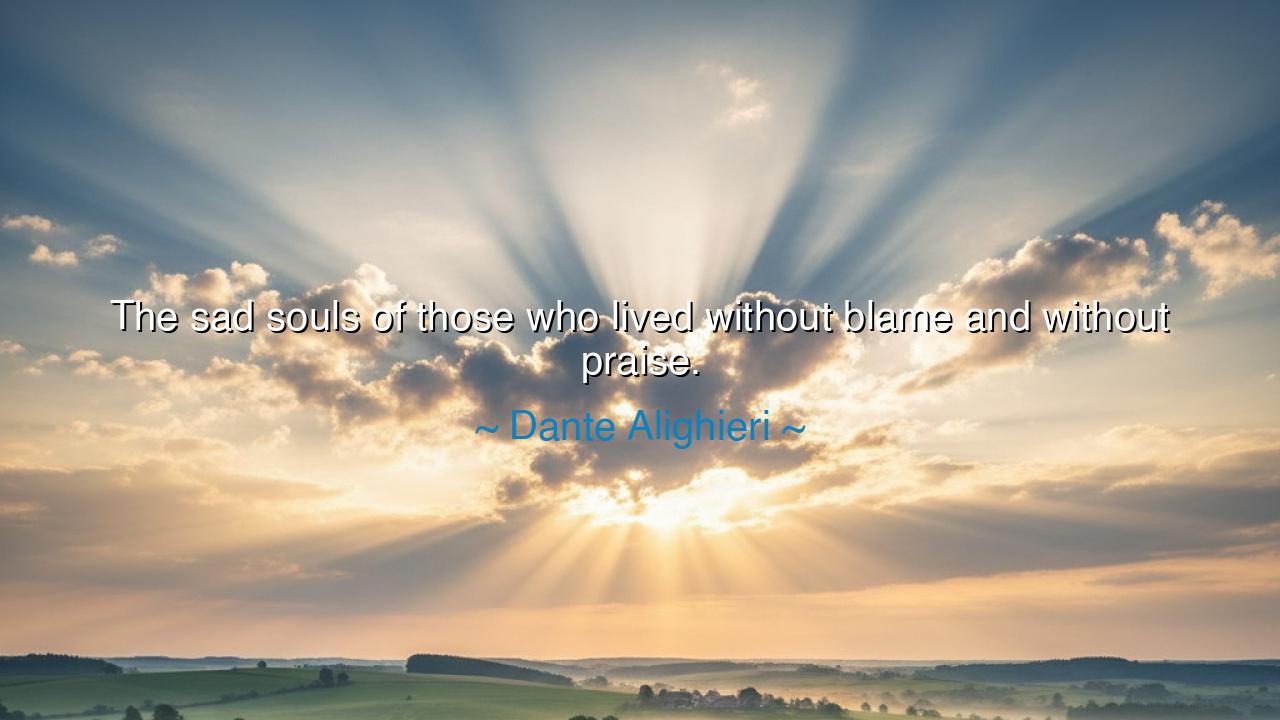
The sad souls of those who lived without blame and without






In the solemn and eternal verses of Dante Alighieri, the poet of souls and shadows, there comes a line that pierces like a blade through the veil of mediocrity: “The sad souls of those who lived without blame and without praise.” This line, drawn from the depths of the Inferno, is not merely a judgment upon the dead, but a warning to the living. It speaks of those who wandered through life untouched by virtue or vice, those who neither sinned boldly nor strove nobly — the tepid hearts who, in fearing to err, forgot to live. Their fate, Dante tells us, is neither heaven nor hell, but the gray void in between — the realm of the indifferent, where the unliving drift, unseen and unloved, for eternity.
These are the souls who took no stand, who uttered no “yes” and no “no,” whose lives were a long, cautious silence. They neither offended nor inspired; they neither harmed nor healed. In their fear of failure, they refused the glory of passion. Dante’s divine insight saw in such neutrality the most grievous of fates — not the sinner burning in repentance, but the spirit so lukewarm that even the fires of punishment reject it. For sin, though dark, at least burns with the heat of will; but apathy is the frost that kills the soul’s very spark.
To understand the weight of this truth, let us turn our gaze to the pages of history. Consider Pontius Pilate, the Roman governor who, when faced with the question of Christ’s fate, washed his hands and declared, “I am innocent of this man’s blood.” He sought to remain blameless, yet in doing so, he became forever bound to cowardice. His name endures not in honor, but in infamy — not for an evil act, but for the refusal to act at all. So too are the “sad souls” of Dante’s vision: those who hide behind the veil of neutrality while the world cries for courage.
For Dante, such souls suffer a punishment most fitting to their sin of indifference. In the Inferno, they chase forever after a shifting banner, stung by wasps and hornets, their blood and tears feeding worms at their feet. This torment is not cruelty but symbol — they are doomed to follow something meaningless, as they did in life, and to feel pain only when it is too late to find purpose. Dante teaches us that divine justice spares neither the wicked nor the fainthearted. The cowardly, though they may escape earthly judgment, find no rest beyond it.
Yet there is mercy even in this warning. The poet does not write to condemn alone, but to awaken. His words cry out across the centuries: “Do not live without fire in your heart.” Better to fail boldly than to drift safely. Better to speak truth and be despised than to be silent and forgotten. The ancients knew this well — in the temples of old, it was said that the gods favored the passionate, for only they carried the courage to create, to destroy, to change the world. The lukewarm, on the other hand, were deemed unworthy even of divine wrath.
Let us then take heed. To live without blame may seem noble, but if it is bought with cowardice, it is the most tragic of fates. To live without praise is to die unnoticed, leaving behind no mark, no echo. The soul is not born for comfort but for challenge; not to hover safely between light and darkness, but to walk bravely through both. The fire of conviction, though it may burn, purifies the spirit; the chill of indifference, though it feels safe, leads only to decay.
So, what must we do? Choose. Choose, even if the choice costs you peace. Speak, even when silence feels easier. Stand, even when your legs tremble. Praise the good and condemn the evil; love with all your being, even if love breaks you. For the heavens themselves smile upon the soul that dares to live fully — that dares to care. To hesitate is to fade into Dante’s gray mist, where the nameless souls wander, neither remembered nor mourned.
In the end, let us remember this eternal teaching: A life without blame may be respectable, but a life without praise is meaningless. Do not seek the safety of neutrality; seek the glory of purpose. Be bold in your living, be fierce in your loving, and be steadfast in your truth. For when the final dawn comes and your soul stands before eternity, may it not be counted among the sad ones who neither shone nor sinned — but among those who, for better or worse, truly lived.






AAdministratorAdministrator
Welcome, honored guests. Please leave a comment, we will respond soon